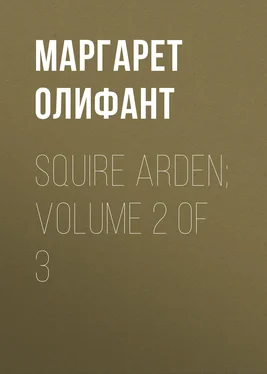Маргарет Олифант - Squire Arden; volume 2 of 3
Здесь есть возможность читать онлайн «Маргарет Олифант - Squire Arden; volume 2 of 3» — ознакомительный отрывок электронной книги совершенно бесплатно, а после прочтения отрывка купить полную версию. В некоторых случаях можно слушать аудио, скачать через торрент в формате fb2 и присутствует краткое содержание. Жанр: foreign_prose, literature_19, foreign_antique, на английском языке. Описание произведения, (предисловие) а так же отзывы посетителей доступны на портале библиотеки ЛибКат.
- Название:Squire Arden; volume 2 of 3
- Автор:
- Жанр:
- Год:неизвестен
- ISBN:нет данных
- Рейтинг книги:5 / 5. Голосов: 1
-
Избранное:Добавить в избранное
- Отзывы:
-
Ваша оценка:
- 100
- 1
- 2
- 3
- 4
- 5
Squire Arden; volume 2 of 3: краткое содержание, описание и аннотация
Предлагаем к чтению аннотацию, описание, краткое содержание или предисловие (зависит от того, что написал сам автор книги «Squire Arden; volume 2 of 3»). Если вы не нашли необходимую информацию о книге — напишите в комментариях, мы постараемся отыскать её.
Squire Arden; volume 2 of 3 — читать онлайн ознакомительный отрывок
Ниже представлен текст книги, разбитый по страницам. Система сохранения места последней прочитанной страницы, позволяет с удобством читать онлайн бесплатно книгу «Squire Arden; volume 2 of 3», без необходимости каждый раз заново искать на чём Вы остановились. Поставьте закладку, и сможете в любой момент перейти на страницу, на которой закончили чтение.
Интервал:
Закладка:
Margaret Oliphant
Squire Arden; volume 2 of 3
CHAPTER I
Up to this time it had been Clare who had made herself anxious about her brother, worrying herself over his ways and his words, and all the ceaseless turns of thought and expression and perplexing spontaneousness which made him so unlike the Ardens; and Edgar had been conscious of her anxiety with a sense of amusement rather than of any other feeling. But now that their positions were reversed, and that it was he who was anxious about Clare, the matter was a great deal more serious. Edgar Arden felt but lightly the slights or the censures of fortune; he was not specially concerned about himself, nor prone to consider, unless on the strongest provocation, what people thought of him, or if he was taking the best way to obtain their suffrage. But this easy mind, which Clare sometimes took as a sign of levity of disposition, forsook him completely when his own duties were in question. He took them not lightly, but seriously, as Mr. Fazakerley, and Perfitt the steward, and everybody connected with the estate already knew. And not even the estate was so important as Clare. He asked himself, with a puzzled sense of ignorance and incapacity, what in such circumstances a brother ought to do. He had all the theories of a young man against any restraint or contradiction of the affections; but held them much more strongly than most young men, who it must be admitted are apt to see very clearly the necessity of interference in the love affairs of their sisters, however much they may dislike it in their own. Edgar had no family training to help him, and he was aware that English habits in such matters were different from those foreign habits which were the only ones with which he had any acquaintance, and which transferred all power in the matter into the hands of parents. Poor Clare! who had no mother to sympathise with her, no father to guide her—was it not his business to be doubly careful of all her wishes, to watch over her with double anxiety, and anticipate everything she would have him to do? But then, supposing she should wish to marry this landless and not very virtuous cousin, this man whose prospects were naught, whose character was so unsatisfactory, and with whom he himself had so little sympathy—would it be right to let her do it? Should he acquiesce simply without a word? Should he remonstrate? Should he speak of it to her? Or should he wait until she had first consulted him? Edgar found it very hard to answer these questions. He took to watching his sister, and her manner to Arthur Arden, her ways and her looks, and every passing indication; and got hopelessly bewildered, as was natural, in that maze of fluctuating evidence, which sometimes seemed to him to go dead against, and sometimes to be entirely in favour of his cousin.
For Clare did not let herself go easily down that dangerous slope. She stopped herself now and then, and became utterly repellant to Arthur; now and then she relapsed into softness. Sometimes she would ask, wonderingly, when he meant to go? “Is he to stay on at Arden for ever? Did you ask him to stay as long as he liked?” she would say with a frown on her brow, expending upon her innocent brother the excitement and restless agitation of her own mind. “Should you like him to stay as long as he wished?” Edgar asked on one of these occasions, with a look which he tried hard not to make too anxious. “I think we were far happier before anybody came,” Clare answered, with curious heat, and a tone almost of resentment. What did it mean? Did she want really to get rid of the visitor? Did she really hate him, as she had once said she did? When Edgar recollected that his sister had said so, and that Arthur Arden had confirmed it, he was quite staggered. And thus June ran on amid difficulties, which much confused the relations between the brother and sister. Lord Newmarch too left traces of himself in the field. He had started a correspondence with both, according to his opportunities—that is, he wrote long letters to Edgar upon the state of the political world, and sent messages and brochures to Miss Arden, who sent him messages in return. If she was to marry either of them, surely Lord Newmarch was the more appropriate of the two. He was younger as well as richer, and, though he was a prig, had the reputation of being a good man. He was galantuomo , as well as my lord; and, alas! it was quite uncertain whether Arthur Arden was galantuomo . Poor Edgar felt like an anxious mother, and laughed at himself, but could not mend it, until at last it occurred to him that the best way was to ask advice. Accordingly, he set out very solemnly one day about the end of June to consult his chief authorities. He meant to conceal his personal trouble under the guise of a fable. He would ask Mr. Fielding what a brother (in the abstract) ought to do in such a position, and he would ask Miss Somers. Miss Somers was not a very wise counsellor; but no doubt her brother must have interfered in her affairs one time at least, and she would have some practical knowledge. He went to lay his case before them with a little trepidation, wondering whether they would find him out at all, and what they would say. Dr. Somers probably would have been the best counsellor of all, but Edgar had no confidence nor pleasure in the Doctor since their last interview. So he chose Mr. Fielding in his study, and Miss Somers on her sofa, two people whose lives had not come to much; but surely they were old enough to know.
Mr. Fielding was in his study writing his sermon. It was the day after one of his grand discussions with the Doctor, and the good man was excited. He was engaged in the manufacture of a polemical sermon, culling little bits out of the polemical sermons which had gone before, but combining them so with links of the new that his adversary might not perceive the antiquity of some of his arguments. It was a relief to him to lay down his pen and clear his mind from the fumes of controversy. “I am very glad to see you, Edgar,” he said. “You find me in the midst of my troubles. Young Denbigh, you know, ought to take the preaching more than he does, but I have no confidence in him in a doctrinal point of view. He would be bringing up some of the new notions, and setting our good folks by the ears—though it is rather hard upon me to preach so often myself.”
“But you are the best able to instruct us, Sir,” said Edgar, who to tell the truth did not often derive a great deal of instruction from Mr. Fielding’s good little sermons. And then the excellent Rector coughed modestly, and blushed a little, and put his paper away from him with a gently deprecating air.
“I suppose, when one lives to be seventy, one must have learned a little—if one has made a right start,” he said, “at least I hope so, Edgar, I hope so; though some of us unfortunately– The thing that startles me is that Somers should take the Calvinist view. I would not judge him—I would be, indeed, the very last to judge any one; but how a man who has lived, on the whole, rather a careless sort of life—not culpable, I don’t say that—but careless, as, indeed, the best of us are—should stand up for hell and torture, and all that, is more than I can guess. If he had taken another view—more lax instead of more strict–”
“Do you think he cares at all?” said Edgar, still under the prejudice of his last interview.
“God bless us, yes; surely he must care; don’t you think he cares, Edgar? Why, then, he must be sniggering in his sleeve at me. No, no, my dear boy, of course he must be in earnest; no man could be such a humbug as that. But if it was Mrs. Murray, who is Scotch, it would seem more natural. I hear she was in Church on Sunday, looking very serious. But, bless me, Edgar, you are very serious too. Is there anything wrong—with Clare?”
Читать дальшеИнтервал:
Закладка:
Похожие книги на «Squire Arden; volume 2 of 3»
Представляем Вашему вниманию похожие книги на «Squire Arden; volume 2 of 3» списком для выбора. Мы отобрали схожую по названию и смыслу литературу в надежде предоставить читателям больше вариантов отыскать новые, интересные, ещё непрочитанные произведения.
Обсуждение, отзывы о книге «Squire Arden; volume 2 of 3» и просто собственные мнения читателей. Оставьте ваши комментарии, напишите, что Вы думаете о произведении, его смысле или главных героях. Укажите что конкретно понравилось, а что нет, и почему Вы так считаете.












